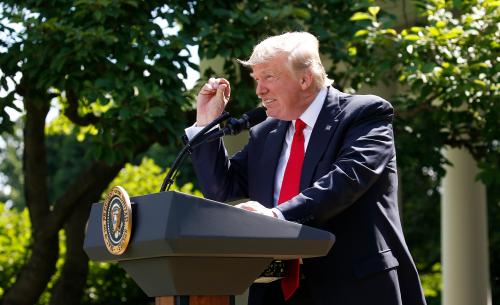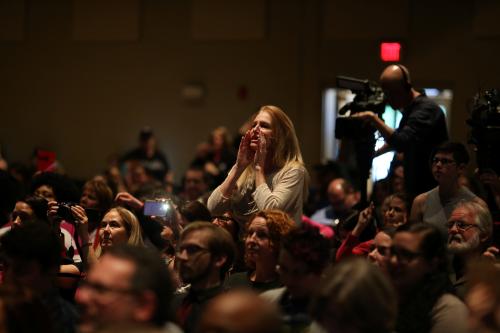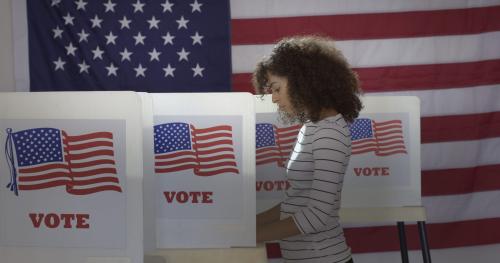After seven years of promises that they would repeal and replace “Obamacare,” a government totally controlled by Republicans is having a very hard time making it happen. A vote to debate the GOP alternative passed by just one vote in the Senate—and required Vice President Pence to play tiebreaker. Despite the Republicans’ narrow victory on the Motion to Proceed, the debate ahead doesn’t guarantee eventual passage of their health care law.
So what’s going on here? What are the lessons?
One of the biggest lessons is that polling rarely tells the real story in politics. And politicians who think it can are bound to find themselves in trouble.
To understand the pitfalls of polling, let’s go all the way back to 1978, before cell phones and the ability to block calls made polling even tougher. In that year, a political scientist named George Bishop and his colleagues at the University of Cincinnati conducted a poll asking citizens the following: “Some people say that the 1975 Public Affairs Act should be repealed. Do you agree or disagree?” Some people responded that they had no opinion on the question. The others were about evenly split.
In 1995, the Washington Post conducted a second poll on whether the 1975 Public Affairs Act should be repealed. This time pollsters asked the question a bit differently. “President Clinton said the 1975 Public Affairs Act should be repealed.” When asked whether they agreed or disagreed, 43 percent of the public expressed an opinion. Democrats agreed with Clinton on repeal and Republicans didn’t.
However, there was never any such a thing as the 1975 Public Affairs Act. Bishop and his colleagues invented it to demonstrate something that became the title of his book: The Illusion of Public Opinion.
Let’s face it. In the 21st century, we are in love with data. And yet, so much of what we rely on from polling is just an illusion—one that gets repeatedly shattered. So let’s go back to polling on the Affordable Care Act, aka Obamacare. Much of the opposition to it was an illusion. As we saw, when Clinton’s name was added to the question about the fake 1975 Public Affairs Act, it distorted the answers in a predictably partisan manner. This has also been true since the beginning of the Affordable Care Act. On the eve of its implementation (September 2013), 37 percent of those polled disapproved of the Affordable Care Act, while 46 percent of those polled disapproved of Obamacare.
In addition and from the beginning, more people liked parts of the law than the law as a whole. For instance, with the exception of the individual mandate, most people, including Republicans, liked the individual provisions of the law.
Taken together, this polling should have been a warning to Republicans, especially once the individual provisions of the law were actually implemented and the law’s popularity skyrocketed. Today, a large number of Americans support individual provisions in the law. One journalist commenting on the polling said, “Apparently all it took for Obamacare to become popular was for Obama to leave office.” The following graph drives that point home:
The point is that in politics, data is a very tricky business. The political world is littered with debris from data that turns out to be fundamentally flawed. The most spectacular example is the Hillary Clinton campaign. Led by young Robby Mook, a thoroughly modern campaign manager, i.e., someone in love with data, the Hillary campaign relied on its models even while other, more traditional politicians were telling them they were in trouble.
Now, as the Trump presidency careens from one embarrassment to another, we are repeatedly told that the Trump base is solid and that therefore, the president is safe from the normal punishments the electorate doles out to politicians. And yet, three political scientists at Emory University have called into question whether or not Trump is defying the laws of political gravity. Most journalists look at the presidential approval numbers among Republicans and conclude that the president is okay with his base. But a new paper covered by the NYT’s Upshot column suggests that the conventional wisdom is missing something critical.
B. Pablo Montagnes, Zachary Peskowitz and Joshua McCrain contend that you can’t just look at presidential approval ratings among Republicans when the Republican party itself appears to be losing support. They argue that “…when presidents are losing support, the naïve partisan approval rate can overestimate the approval rate among presidential co-partisans because of compositional change.” In other words, the four-point decline in the number of people identifying with the Republican party since the 2016 election most likely reflects the fact that Republicans who disapprove of the president aren’t too fond of calling themselves Republicans, resulting in high approval ratings among a smaller group of people.
These researchers showed once again that politicians can’t count on polls to tell them the whole story. The Republican party has staked their political fortunes on repealing the Affordable Care Act, and President Trump has repeatedly claimed that he could do better than Obama. The cheering section for repeal might have shrunk too much for them to cash in now. The Republican health care law may still pass and Trump may still right his wobbling presidency, but to all who think data is the answer: beware.








Commentary
The Obamacare repeal and the illusion of public opinion
July 25, 2017